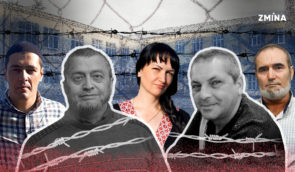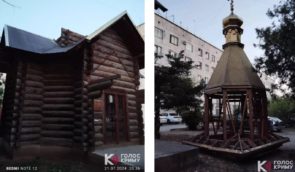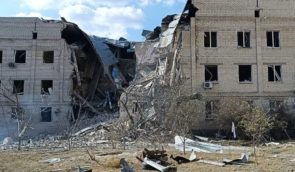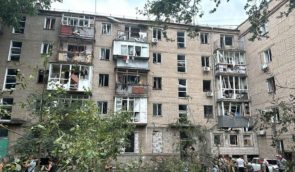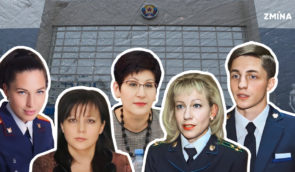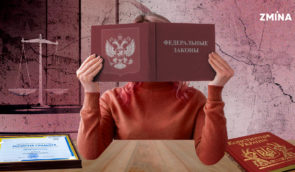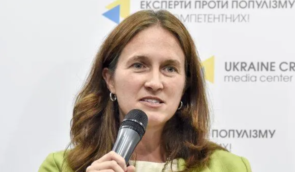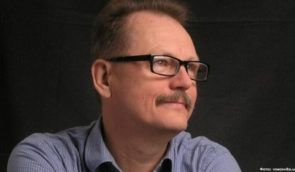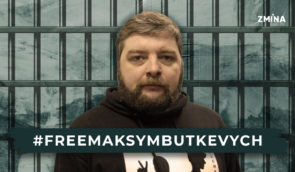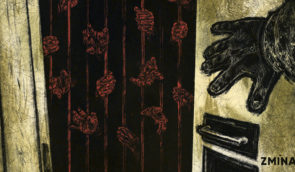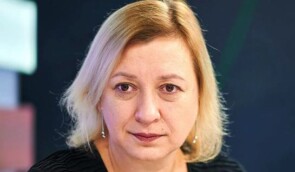Ukraine’s groundbreaking database exposes foreign components in Russian and Iranian weaponry, raising concerns about international supply chains
The National Agency on Corruption Prevention (NACP) launched the world’s first open database of foreign components in weapons on its “War and Sanctions” portal. The database already includes more than 2,000 components used by Russia and Iran in various types of unmanned aerial vehicles (UAVs), missiles, electronic warfare systems, and many other types of weapons and military equipment.
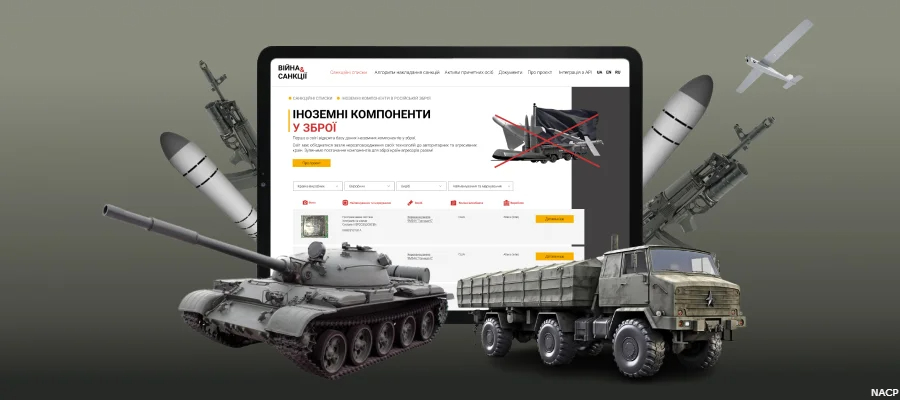
The NACP officials elucidated that the entire democratic world must unite around a policy of non-proliferation to aggressors of its technologies. They say that only in this way can the world community maintain peace, security, and stability at the global level. It was for this purpose that a database of components was created.
“Thousands of electronic components that were once intended to improve life and serve development, Russia and Iran are turning into weapons for murder. Revealing their path from the manufacturer to the hands of the killers is a large-scale task for any government agency. But this is within the power of thousands of journalists, investigators, customs officers, bankers, consultants, and others who seek justice and peace. Now that these data are publicly available, everyone can contribute to global world security,” – Oleksandr Novikov, the head of the NACP said.
Technical specifications of the weapons and the identities of their manufacturers are available for each component. This information will empower anyone, from investigative journalists to government officials, to gather evidence, investigate supply chains, and bring those who facilitated this war to justice.
The NACP has assured that the “Foreign Components in Weapons” section will be regularly updated and enhanced. The government agency plans to introduce a subscription option for list updates later. Once a new component is added, all subscribers will be notified promptly.
The NACP has expressed its gratitude to the Ukrainian Armed Forces, who risk their lives daily to seize these weapon samples, and to the researchers who work tirelessly to analyze them despite the numerous booby traps concealed within them.
The governmental agency also has listed Knauf, one of the world’s largest manufacturers of building materials, and Fluxys, a Belgian independent gas system operator, on its list of international war sponsors for paying taxes in Russia and abetting Russia’s war against Ukraine.
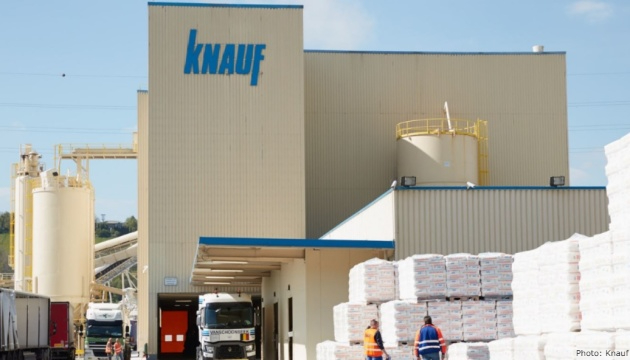
According to the NACP, in 2022 alone, one of the world’s largest manufacturers of building materials, Knauf, paid about 117 million dollars into the budget of the Russian Federation. The NACP accuses the German company of actively promoting mobilization in Russia, sending its employees to the war against Ukraine. This was why the NACP included Knauf in the list of international sponsors of the war.
Since 1993, Knauf has invested over 1,650,000,000 euros in the Russian economy. The company is represented in Russia by 10 subsidiaries, 20 plants, and almost 30 resource centres. The German manufacturer of building materials employs 4,000 people in Russia. Today, Knauf is the largest German investor in the Russian construction industry, states the NACP.
The NACP asserted that Knauf’s management is closely linked to the Kremlin regime. For example, the company’s co-owner, Nikolaus Wilhelm Knauf, had the status of Honorary Consul of the Russian Federation for 23 years (from February 1999 to March 2022), with a representative office in Nuremberg.
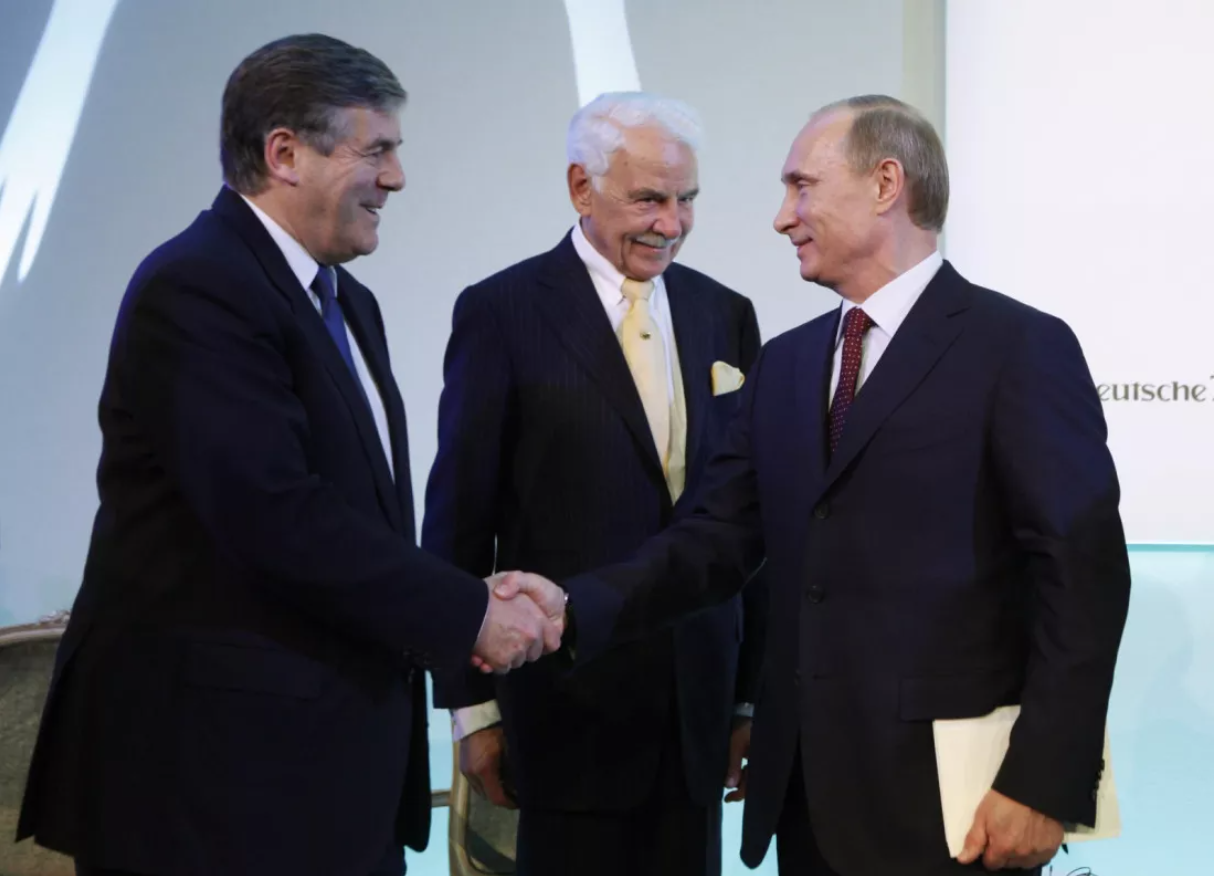 Russian President Vladimir Putin (R) shakes hands with ex-Deutsche Bank Chief Executive Officer Josef Ackermann (L) and the head of Knauf Group Nikolaus Wilhelm Knauf in 2010
Russian President Vladimir Putin (R) shakes hands with ex-Deutsche Bank Chief Executive Officer Josef Ackermann (L) and the head of Knauf Group Nikolaus Wilhelm Knauf in 2010Knauf also has facilities for producing acoustic ceiling panels and suspension systems in the Alabuga Special Economic Zone in Tatarstan, where Russians organize the production of the Shahed-136 UAV.
The NACP recalls that after Russia’s full-scale invasion of Ukraine, the company officially made it clear that it saw no reason to leave the aggressor’s market:
“We will remain in Russia as long as the political and commercial situation allows us to do so. We clearly have responsibility for more than 4,000 employees and their families, as well as for customers and suppliers, many of whom we have had excellent and long-standing relationships with over the years,” Knauf said in a statement.
In October 2022, the German media reported that Knauf mobilized its employees into the ranks of the Russian armed forces. It was said that the Russian managers of the Knauf plant in Krasnogorsk, near Moscow, agreed with the authorities on the lists of those needed in production and who could be sent to the war against Ukraine. Some of those who received a draft notice were taken to military enlistment offices in a company minibus.
The NACP blames Knauf specialists for continuing to build cities in the aggressor state, even as thousands of residential buildings in Ukraine have been destroyed by the Russian army funded, among others, by Knauf’s tax contributions.
Additionally, the NACP added Belgian independent gas system operator Fluxys to the list of international sponsors of war due to its role in facilitating the export of Russian liquefied natural gas (LNG). This LNG trade provides financial resources for the Russian invasion of Ukraine.
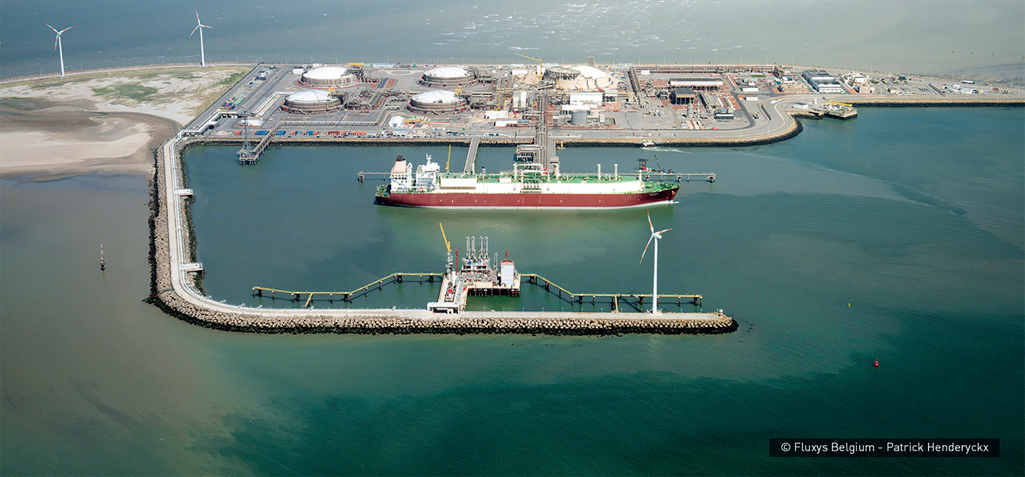
Fluxys is blamed for providing storage and transhipment facilities for RussianLNG to Yamal LNG at its terminal in Zeebrugge.
The majority share of Yamal LNG belongs to the Russian gas company Novatek, which is directly involved in financing military aggression and war crimes in Ukraine.
A detailed analysis conducted by the Institute for Energy Economics and Financial Analysis (IEEFA) in 2022 found that Fluxys and its shareholders profited by facilitating Russian LNG exports to Asian, South American, and Middle Eastern markets, particularly during the winter of 2021–2022.
Novatek, a company owned and controlled by Russian oligarchs Leonid Mikhelson and Gennady Timchenko, is the main supplier of Russian LNG to international markets. The NACP emphasizes that Mikhelson and Timchenko are members of Vladimir Putin’s inner circle and, with his regime’s help, have accumulated vast stakes in Russian oil and gas projects.
Novatek is the largest private natural gas producer in Russia. In July 2014, the company was included in the United States and Canada sanctions lists. In 2016, the United States imposed sanctions on several Novatek subsidiaries. On November 2, 2023, the United States imposed sanctions against the Arctic LNG 2 project, which was intended to double Novatek's export capacity.
NACP
Fluxys’ services have helped replenish Russia’s budget by an estimated 800 million euros in 2023 alone. To illustrate the scale of this contribution, the NACP has compared it to the cost of eight Su-35 fighter jets or 800 Kalibr missiles. These weapons could be used to attack Ukraine’s energy infrastructure and harm civilians during the winter.
These are well-known facts. Fluxys is well aware of this but continues to sponsor Russia's war.
Oleksandr Novikov, the head of the NACP
ZMINA has sent information requests to Knauf and the Fluxys asking them to respond to NACP’s statement.
Knauf answered ZMINA that it remains in Russia because the German government has not required the company to withdraw from the Russian market. Knauf called the NACP’s inclusion of the company on the “List of War Sponsors” arbitrary and unfounded.
“We do not understand why Western competitors of Knauf, who are also engaged in the same business activities in Russia, are not listed on the ‘List of War Sponsors,’ unlike Knauf. According to the NACP, there are no formal selection criteria,” Knauf stated.
The company has not disclosed the amount of taxes it paid to the Russian government in 2023.
Fluxys has not responded to ZMINA’s request.
Furthermore, the role of the NACP in sanctions policy is provided for in the Individual Sanctions Roadmap developed by the Stanford International Working Group on Russian Sanctions.
The NACP emphasizes it is the governmental body responsible for promoting the development of a compliance system in the private sector. During compliance procedures, counterparties are subject to integrity checks, including compliance with socially responsible business practices following OECD standards.
Earlier, the NACP added one of the world’s largest diamond manufacturing and exporting Indian companies, Shree Ramkrishna Exports (SRK) and the Swiss food maker, Nestlé, to the list of international sponsors of war. The full list of those companies whose taxes are being used to fund the war in Ukraine is published on the NACP’s homepage.
Reuters with reference to six sources reported that during the discussion of the new 12th sanctions package against Russia, some EU member states have opposed the clause, which would significantly limit the re-export of many European goods to Russia.
As reported by Bloomberg in November 2023 the European Commission proposed prohibiting importers from reselling, in particular, semiconductors used in Russia to produce weapons and that a certain amount be put into a special deposit account to comply with these requirements.
In case of violation of these requirements, Bloomberg wrote that at least half of this amount would be transferred to the trust fund for Ukraine, and the contracts would be terminated. Exporters will also be required to inform national authorities of any violations by third-country companies.
However, diplomats from a group of major EU member states raised several concerns about the proposals, including questions about their legality and whether such guarantees and conditions could be demanded from importers.
Bloomberg’s sources said that the countries also want to narrow the scope of the proposed rules and reduce the list of goods to which the new laws will apply. These member states also fear that contractual requirements could put European companies at a competitive disadvantage.
Last month, Russian President Vladimir Putin signed a law on the federal budget for 2024-2026, allocating record spending on prolonging war against Ukraine. The law significantly boosted Russia’s spending in 2024, including record expenditures for the army and the defense industry.
The federal budget for 2024 envisages 36.66 trillion rubles (412,500,000,000 US dollars) in government spending and a budget deficit of 1.6 trillion rubles (9,500,000,000 US dollars). Last year Russia’s Finance Ministry reportedly allocated 6.41 trillion rubles (72,100,000,000 US dollars) for defense in 2023, bearing in mind that the lion’s share of the Russian budget is still classified.
By way of background, during the genocidal war against the Ukrainian people, the totalitarian Russian Federation is committing war crimes and crimes against humanity.
Russia unlawfully deports Ukrainian children to its territory. According to the National Information Bureau, as of August 2023, it has deported or brought out 19,546 children from Ukraine. This number includes only children whose names and circumstances of deportation are known. Ukrainian authorities state that the number of deported children is unknown because they cannot access the temporarily occupied territories. 387 children have been successfully returned.
Russian President Vladimir Putin’s war in Ukraine has led to numerous global crises, endangering energy and food security in African countries and causing inflation and debt growth globally.

